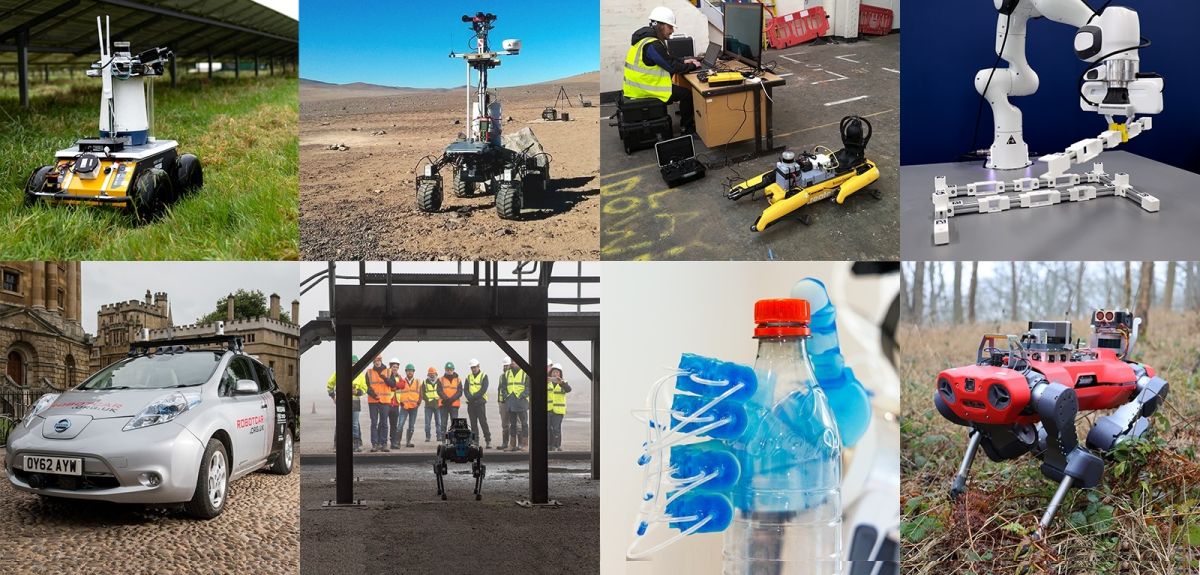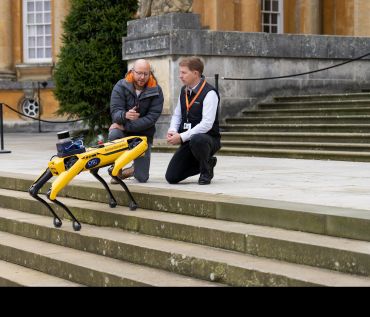
Oxford Robotics Institute wins prestigious Queen’s Anniversary Prize
The Oxford Robotics Institute (ORI) has been awarded a Queen’s Anniversary Prize for innovation in autonomous robotic technologies. This prestigious award is the highest national honour available to universities and further education colleges across the UK.
The Queen’s Anniversary Prizes are part of the UK’s national Honours system, recognising outstanding work by UK colleges and universities which demonstrates excellence and innovation, and delivers real benefit to the wider world. First awarded in 1994, the Prizes are granted every two years by the Sovereign on the advice of the Prime Minister following a rigorous and independent process of review carried out by The Royal Anniversary Trust, an independent charity.
I am thrilled that the Oxford Robotics Institute has been awarded the Queen’s Anniversary Prize. Their work is a fantastic example of our researchers collaborating with industry to come up with cutting-edge solutions to the world’s challenges, from supporting sustainability in agriculture to improving safety in manufacturing. Congratulations to all those involved!
Professor Irene Tracey, Vice-Chancellor of the University of Oxford
The University of Oxford is among 22 UK educational institutions announced as winners of the 2023 Queen’s Anniversary Prizes. The winners of the fifteenth round, selected from over one hundred entries, were announced at a special reception at St James’s Palace last night.
The award recognises the ORI’s achievements in delivering fundamental advances in autonomous robotics technology, providing new capabilities to industry and society, and supporting future sustainability and growth in sectors such as transport, agriculture, and energy. Part of the Department of Engineering Science, the ORI grew from a nucleus of a single research group in 2003, to an independent research institute in 2016. Today it is home to 100 people across seven research groups, who carry out fundamental research in robotics and artificial intelligence, as well as working directly with partners in sectors such as construction, agriculture, care, manufacturing, and energy.
Nick Hawes, Professor of AI & Robotics & Director of the ORI said: 'I am hugely excited for the University to receive this award that recognises the energy, passion, and ingenuity of the researchers and staff from the Oxford Robotics Institute. The prize reflects the significant impact their work has had on a range of sectors, from transport to agriculture, and highlights the huge potential of our work to address future societal challenges including the transition to Net Zero and space exploration.'
 ‘Spot’ the robot dog in action at Blenheim Palace. Credit: Oxford Robotics Institute.
‘Spot’ the robot dog in action at Blenheim Palace. Credit: Oxford Robotics Institute.- Producing RobotCar, the first autonomous vehicle permitted on public roads in the UK, with support from EPSRC and Nissan;
- Developing navigation technology that will fly on ESA’s Rosalind Franklin rover;
- Innovation in hardware, perception, control and decision making for robotics in extreme environments, as a major participant in the UKRI Industry Strategy Challenge Fund Robots for a Safer World programme:
- Validating the safety and capability of robotics technologies in over 380 field trials in locations as diverse as Icelandic volcanoes, the Atacama Desert, mines in Wiltshire and Kentucky, Loch Ness; and the surroundings of the JET fusion reactor;
- Partnering in DigiForest, a Horizon Europe project developing innovative robotics and analytics technology to enable sustainable forestry (including supporting quantification of a forest's carbon sequestration);
- Publishing over 900 papers and raised over £40M of funding from research councils, companies, and donors;
- Generating at least 22 patents, 70 Intellectual Property licences and four start-ups;
- Developing the next generation of AI and robotics researchers by training over 120 PhDs, 40 postdoctoral researchers, and at least 60 Masters students.
 A Clearpath Husky robot driven off-road to test a visual teach and repeat navigation algorithm. Credit: Oxford Robotics Institute.
A Clearpath Husky robot driven off-road to test a visual teach and repeat navigation algorithm. Credit: Oxford Robotics Institute.The winners will be presented with a medal and certificate at a formal Honours ceremony in February 2024. Further information about the Awards can be found on the Queen's Anniversary Trust website.
 Left to right: Professors Nick Hawes, Paul Newman, and Ronald Roy from the Oxford Robotics Institute at the Queen’s Anniversary Prizes reception held at St James’s Palace. Credit: Ian Jones.
Left to right: Professors Nick Hawes, Paul Newman, and Ronald Roy from the Oxford Robotics Institute at the Queen’s Anniversary Prizes reception held at St James’s Palace. Credit: Ian Jones. Landmark study definitively shows that conservation actions are effective at halting and reversing biodiversity loss
Landmark study definitively shows that conservation actions are effective at halting and reversing biodiversity loss
 Researchers find oldest undisputed evidence of Earth’s magnetic field
Researchers find oldest undisputed evidence of Earth’s magnetic field
 Honorary degree recipients for 2024 announced
Honorary degree recipients for 2024 announced
 Vice-Chancellor's innovative cross-curricular programme celebrated
Vice-Chancellor's innovative cross-curricular programme celebrated
 New database sheds light on violence in Greek detention facilities
New database sheds light on violence in Greek detention facilities